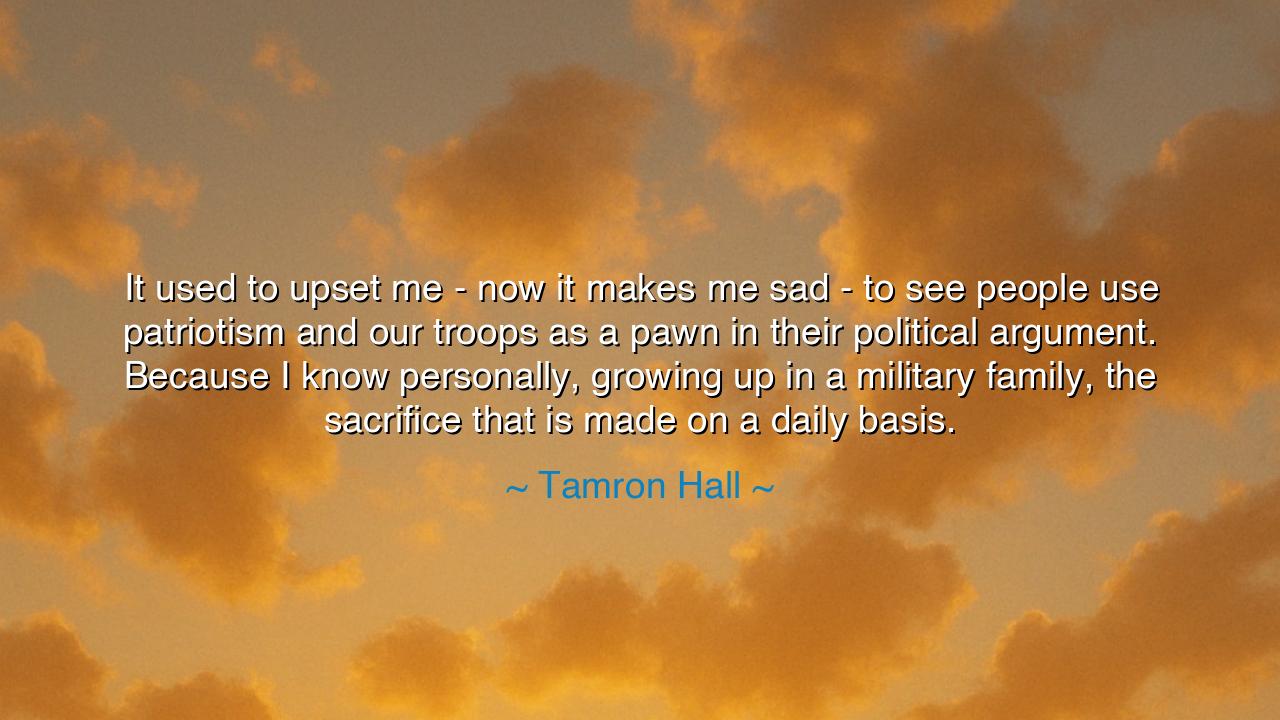
It used to upset me - now it makes me sad - to see people use
It used to upset me - now it makes me sad - to see people use patriotism and our troops as a pawn in their political argument. Because I know personally, growing up in a military family, the sacrifice that is made on a daily basis.






“It used to upset me – now it makes me sad – to see people use patriotism and our troops as a pawn in their political argument. Because I know personally, growing up in a military family, the sacrifice that is made on a daily basis.” Thus spoke Tamron Hall, and her words are heavy with sorrow, yet bright with truth. For in them lies a lament that the sacred has been twisted into the common, that the noble sacrifice of soldiers and the flame of patriotism have been used as tokens in the game of power. What should be revered as holy is instead wielded as a weapon of rhetoric. Her grief is the grief of one who has seen, not from afar, but within her very household, the price of duty borne in silence by those who serve.
To understand her words, we must remember what patriotism truly means. It is not the shouting of slogans nor the waving of banners only when convenient. It is not to claim the soldier’s honor while knowing nothing of the soldier’s burden. True patriotism is sacrifice, long and unrelenting—the parent deployed far from home, the child waiting anxiously for their return, the family who lives in uncertainty yet endures with quiet strength. These are not arguments in a debate; they are lives, hearts, and daily struggles.
Think of the soldiers of Normandy, who stormed the beaches under a hail of fire. Their courage was not a tool of politics; it was a gift of blood for the freedom of millions. Or consider the nurses and medics who tended to the broken in distant fields, their days filled with cries of pain and the weight of lives slipping away. They did not serve for applause or for partisan banners. Their service was pure, born of duty and love of country. To use such sacrifice as a pawn in quarrels of ambition is to dishonor their memory.
Tamron Hall speaks with the authority of the witness, for she grew within the shadow and the light of a military family. She saw the small daily sacrifices: birthdays missed, sleepless nights, constant uncertainty, and the weight that never leaves the shoulders of those in uniform. Such sacrifices may never fill the speeches of politicians, but they are the true currency of freedom. And when their service is reduced to slogans, when their lives are drawn into arguments of convenience, sorrow rightly fills the heart of the one who knows the truth.
The wisdom here is simple and profound: respect the sacred weight of patriotism and the service of the troops. To use them cheaply is to turn gold into dust. Let no one exploit the devotion of soldiers for victory in debate. Let no one mock the grief of families for the sake of political triumph. For the blood shed on battlefields and the tears shed in quiet homes are not weapons—they are offerings, holy and eternal.
And what then shall we do? We must honor the troops not only in words but in deeds: care for the wounded when they return, support the families who wait, and vote for policies that guard their well-being. Do not use their names as ornaments in arguments. Instead, let your actions reflect gratitude. Serve your community, stand for justice, and live in such a way that their sacrifice is not in vain.
Practically, this means when you hear patriotism invoked for selfish gain, remember Hall’s grief and speak with discernment. When you see the flag raised, honor not the cloth but the lives woven into its fabric. And when you encounter a veteran or a military family, give thanks—not with hollow praise, but with true respect and support. For in lifting them, you keep faith with the nation itself.
So let these words of Tamron Hall echo through the generations: patriotism and the sacrifice of troops are not pawns, but pillars. Treat them as sacred, and your nation will stand strong. Treat them as tools, and the foundation will crumble. Choose, then, the way of reverence, that the flame of honor may burn undimmed across the ages.






AAdministratorAdministrator
Welcome, honored guests. Please leave a comment, we will respond soon